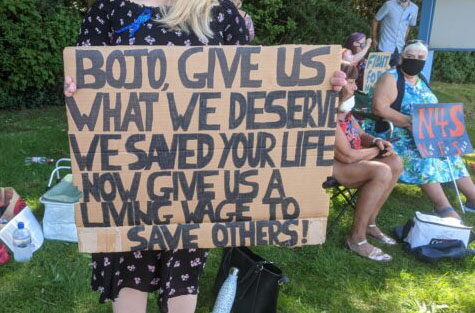Where is the money for council services?
“The financial outlook is volatile.” This (under)statement, in Essex County Council’s budget document for 2021, could be the strapline for the future of all local government services.
Last year, Rishi Sunak did what government ministers do in a crisis. He praised the emergency services and ‘pledged’ a sum of money with lots of noughts on the end.
Councils were told to set up community hubs, deliver food and medication to people shielding, organise test-and-trace support payments, and accommodate all rough sleepers. Councils, already on their knees from years of cuts, but most are yet to see any of the promised additional funds.
Sunak’s short-term Covid funding, far from being ‘whatever it takes’, falls way short of what councils need long term. This year, financial pressures have been compounded by councils losing their usual income from council tax, car parking, business rates due to lockdown measures, and people struggling financially.
Some, like Essex County Council in my area, are dipping into their reserves in order to ‘balance the budget’ this year. But this still means cuts.
Local government trade unions need to lead a fight to defend jobs, terms and conditions at work, and vital services, and only support councillors who take a stand against cuts.
Eleanor Donne, Unison Basildon local government branch committee (personal capacity)
The chief executive of the local authority that I work for wrote to staff last year to tell us that the in the future the council “will be a smaller, more streamlined organisation”, due to financial restraints caused by the pandemic.
My local authority has a £6 million funding gap between the costs incurred during the pandemic and the Tory government shortfall to cover this. Councils up and down the country are affected similarly. Rishi Sunak’s budget has not bridged this Covid-19 shortfall.
While adapting my usual job to delivering food supplies to the shielding community during the first lockdown, I came across many homes that had been converted into multiple one-room residences. When I commented on this to a senior council executive, they admitted that they aren’t in a position to offer these people suitable accommodation.
Short-term staff contracts aren’t generally being extended, including in already short-staffed services. This will lead to even higher workloads and stress for remaining staff, and a worse service provided to the public.
John Dolan, Haringey Unison social care co-convenor (personal capacity)
Why no NHS pay rise?
It comes as no surprise that NHS pay has been missed out of the budget by Rishi Sunak. The unions have submitted their claims to the Pay Review Body. With pressure from below by grassroots campaign NHS Pay 15, Unite and GMB support a 15% pay rise, the Royal College of Nursing (RCN) 12.5% and Unison £2,000.
But the Pay Review Body announcement has been delayed until May. Rishi Sunak claims he is waiting for that, but he is hiding behind the timing of it. If the Tories had any intention about addressing patient safety, protecting the NHS and investing in staff, they would have prioritised a pay rise way earlier.
The whole process with the Pay Review Body constitutes an additional layer of bureaucracy in national pay negotiations. It puts a ‘middle man’ between the government and unions.
The unions have been calling for the government to bring pay talks forward for months. We know poor pay in the NHS is having a direct impact on patient care, due to a chronic shortage of staff.
The government has had plenty of opportunity to invest in the pay rise that exhausted and hardworking staff deserve. In real terms, health workers have had a pay cut of 15%-20% over the last decade.
If restoring our pay isn’t prioritised, more staff will leave. Surveys show that as many as one in three are thinking about leaving the NHS due to poor pay and working conditions.
We must be organised, and ready to ballot for industrial action. It is predicted that the government will suggest a pay ‘rise’ between one and 3.5%. We must be ready to reject this.









